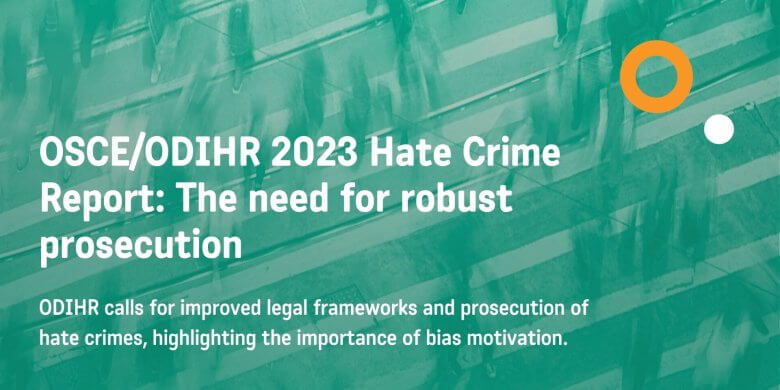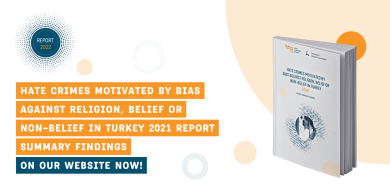OSCE: Robust prosecution is essential to combat hate crime

The Organization for Security and Co-operation in Europe’s (OSCE) Office for Democratic Institutions and Human Rights (ODIHR) launched its 2023 annual hate crime report, emphasizing that effective prosecution of hate crime is crucial for victim support and broader societal policy. The comprehensive report highlights the prevalence of hate crimes in the OSCE region, and the challenges faced in addressing them across the OSCE region, including in Türkiye.
Bias motivation: The key to addressing hate crime
ODIHR stressed that identifying and prosecuting hate crimes based on their bias motivation is essential to protecting victims’ rights and ensuring accurate legal and policy responses. “ODIHR’s hate crime report is the largest dataset on hate crime in the world, used across the OSCE region to develop effective responses,” highlighted Tea Jaliashvili, ODIHR Director’s Alternate and First Deputy Director. She acknowledged the indispensable role of civil society in documenting and combatting these crimes, calling it a vital partner in this effort.
ODIHR’s report emphasized under-representation of certain victim groups, reflecting limited capacity among some civil society organizations to monitor hate incidents and support vulnerable groups. To address this, states must remove barriers by ensuring adequate funding, repealing restrictive laws, and involving civil society in policymaking to combat hate crime effectively.
The 2023 report draws from official data provided by 48 OSCE participating states, supplemented by nearly 10,000 cases reported by civil society organizations and international partners. ODIHR found that incomplete or inadequate legislation in many states continues to hinder the effective prosecution of hate crimes, often resulting in misclassification as hate speech or other non-bias-motivated offenses. This also limits victims’ access to justice and support as well as creating gaps in legal responses to hate crimes.
Incident data by bias motive in OSCE region:
- Anti-Semitic: 4,484
- Racist and xenophobic: 3,069
- Anti-LGBTI: 1,632
- Anti-Christian: 583
- Gender-based: 398
- Anti-Muslim: 238
- Disability: 37
- Anti-Roma: 34
- Other based on religion or belief: 3
ODIHR highlighted a sharp increase in hate incidents targeting Jewish and Muslim communities and their places of worship and properties, indicating that this pattern particularly intensified after October 7, 2023, following Israel’s large-scale and intense military operations in Gaza.
Tools for prosecutors and policymakers
To address the ineffective prosecution and misclassification of hate crimes, ODIHR has introduced a practical guide titled Hate Crime Prosecution at the Intersection of Hate Crime and Criminalized “Hate Speech”. This guide provides guidance for prosecutors to select appropriate charges, incorporate bias motivations into cases, and coordinate effectively with law enforcement and courts. It also serves as a resource for decision-makers evaluating hate crime policies and legislation and for civil society organizations in their advocacy work.
Türkiye: Key observations
In 2023, Türkiye’s public officials reported 93 cases of hate crime, however these were not disaggregated by bias motivation. Civil society organizations, including Freedom of Belief Initiative, reported 86 incidents, specifying the bias motivation as follows:
- Racist and xenophobic: 45
- Anti-Christian: 16
- Gender-based: 13
- Anti-LGBTI: 13
- Anti-Roma: 8
- Anti-Semitic: 8
- Anti-Muslim (including Alevis): 6
Incidents by type of crime (recorded by police) :
- Attacks against places of worship: 88
- Threats/threatening behaviour: 5
Incidents by type of crime (reported by civil society):
- Violent attacks against people: 64
- Threats: 23
- Attacks against property: 22
| Please click here for the Freedom of Belief Initiative’s “Hate Crimes Motivated by Bias against Religion, Belief, or Non-Belief in Türkiye 2023” summary report which aims to prevent hate crimes and end impunity. |
ODIHR highlights that Türkiye has made progress in hate crime reporting and training, notably implementing ODIHR’s Training Against Hate Crime for Law Enforcement (TAHCLE) program in 2016 and introducing relevant modules in judicial training programs. ODIHR adds, country’s Human Rights Action Plan 2021, includes measures to address hate crime and support victims.
Türkiye also informed ODIHR’ that on 1 November 2023, the Grand National Assembly of Türkiye approved new policy measures for 2024-2028 to monitor discrimination and hatred. The measures include the creation of a database to allow for the collection of statistics on criminal offences and misdemeanours involving hate and discrimination.
However, ODIHR also observes critical points related to addressing hate crimes in Türkiye:
- Bias motivations are not consistently recorded in hate crime investigations.
- The legal framework could benefit from review to ensure acknowledgment of bias motivations and appropriate penalties for perpetrators.
ODIHR called on all participating states to strengthen their legislative frameworks and enforcement mechanisms to meet OSCE commitments. This includes promptly investigating hate crimes, ensuring bias motivations are recorded, and imposing effective penalties reflecting the severity of such crimes.
With its comprehensive resources and tailored initiatives, ODIHR supports states in combating hate crime through improved legislation, training, and victim support systems.
For more details, the full 2023 report and additional resources are available on the ODIHR website.



